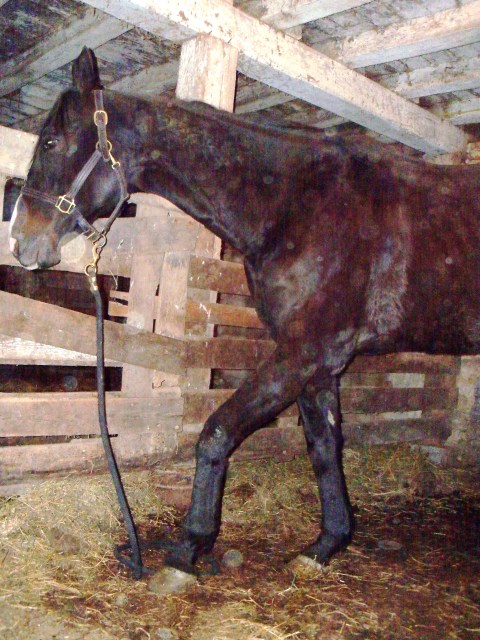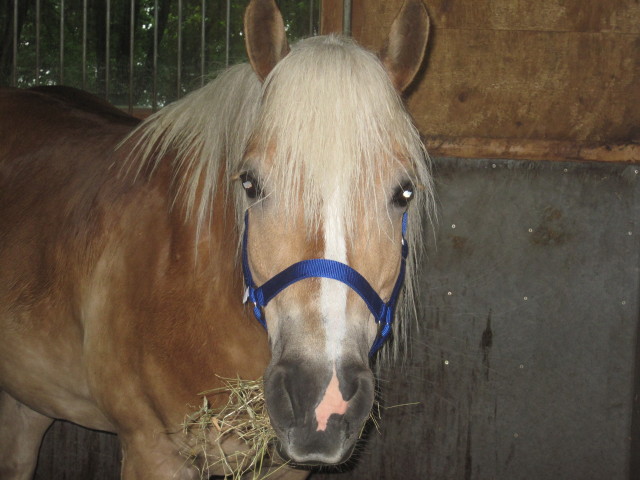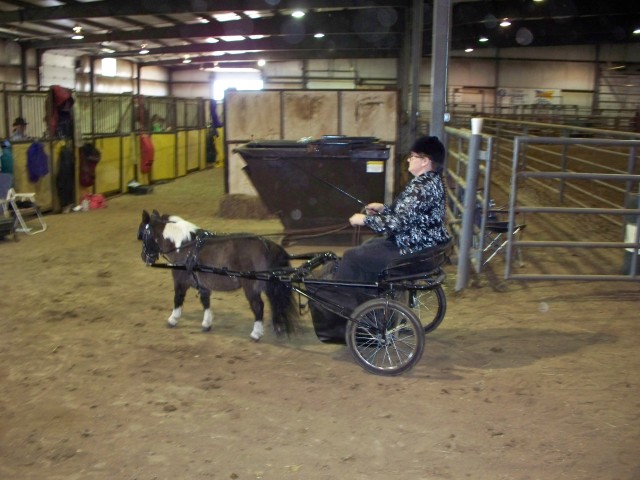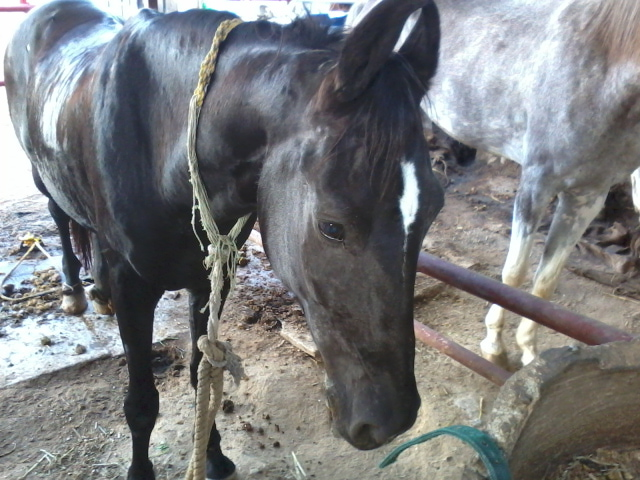QuestionQUESTION: Hi and thanks for helping on this site!
I have a 17 yr old gelded TB who was trained but not raced. He then did quite a bit of dressage and jumping as far as we know. Eats 3 times the feed to stay at weight. Tall and sweet. Jazz started to act lame in front left in this past spring. Some days better and some days worse. Lounged him lightly when looking better. Now in Sept he suddenly had difficulty lifting his front right foot like he was timid to lift, advance and place it down. Within a few days, his left rear leg was also slow and timid - almost unsteady. He will move slowly around the paddock to get food and water, but mostly stays put. A note: we had to put a mare down two months ago for thyroid failure. Our Vet is young and I would appreciate any suggestions from you. Thanks very much. Jeff
ANSWER: Hi Jeff -
I need to answer you back with a few more questions about Jazz. Regarding his weight issues and increased diet ... have his teeth been check/floated regularly? Also, is he consuming large quantities of grain in order to stay at weight or is the additional feed beet pulp or hay? With his lameness on the left front, it would be necessary for him to shift a heavier burden on his right front and this can cause what is called "complimentary" lameness issues. The one that worries me the most is rotation of the coffin bone or founder. Since you mentioned that he was almost unsteady though, I'm wondering if he gives you the impression that he might fall. Does he look like he is unbalanced or dizzy? This could indicate something neurological ... perhaps EPM which is carried by opossums but that would have to be diagnosed by your veterinarian. It sounds like there are several factors here Jeff with many variables. I look forward to hearing back from you.
Thank you for sharing Jazz's story with me!
Judi
---------- FOLLOW-UP ----------
QUESTION: Hi Judi,
Yes Jazz has had his teeth floated each year. He eats everything very well. He is on about nine pounds of grain - half in am and half at night - 14% protein, Dynasty Pro brand. Very good quality 2nd and 3rd cutting grass/alf mix. Lots of apples lately - maybe 15-20 a day. I add this because the timing for the apples being added to his diet correlate to the sudden severe lameness. Lets see... I have rubbed and poked every joint in his spine, top to bottom with no sign or reaction. Legs stretch up and out fine. Head reaches shoulders and chest on his own. No heat in legs, joints or feet/coronet. Feet and legs were all check two days prior to this sudden worsening by very competent ferrier. He was actually checking for the cause of the original single front leg soreness. No absseses or soreness in any of the feet then. He "tonged" them all. So, this has all happened in the past 8-10 days I think. He does not seem to totter at all. His ballance is fine even with pulling his tail sideways. he has become much more sore as of yesterday. He almost hunches his back to pull his back feet forward now. Almost like a bunny hop. Does not drag any feet tho. I do appreciate you help with this. Jazz is a rescue with unknown history other than the race training and some amount of jumping in the past with a possible stifle injury years ago. His knowledge shows his dressage training. Sweet disposition, big and willing. We hate to see him hurt and of course want him better for his own good. Thanks very much. Jeff
ANSWER: Jeff -
Thanks for all the additional information about Jazz - I can tell that you know exactly what you're doing. It seems as though you have checked out everything that should give us some clues as to what is going on here. I have to tell you that I'm completely baffled by his soreness if we can't tell where the pain is coming from and if Jazz doesn't react to any pushing, pulling or palpating done to all of his muscles, bones, joints and feet. The one thing that concerns me is his diet.
His diet appears to be very high in protein, calories and starch so I'm curious as to how he would do if the protein was minimized and his fat intake increased with supplements like Empower (a Nutrena product) or beet pulp. I found the following exert from an equine nutrition consultant -Amy Gill, PhD - quoted in The Horse magazine:
"Starch--Traditionally, horse owners and feed manufacturers have used starch-rich cereal grains, such as oats and corn, to provide added calories, says Pagan. But that practice has increasingly fallen into disfavor as research has shown that too much starch can cause health problems. In a worst-case scenario, the small intestine can be overloaded, ultimately leading to the release of endotoxins into the bloodstream and potentially colic or laminitis, says Pagan. In addition, notes Gill, some horses have intense reactions to starch, as the digestion process creates a spike in blood glucose and insulin levels that can lead to excitability."
I also think apples are okay as occasional treats however the sugar/carbohydrate/starch content in 15 - 20 apples given daily concerns me a great deal. Especially if they are older apples and perhaps a bit fermented with even higher sugar content. I'm afraid that these are empty and potentially dangerous calories when fed in this quantity. It's not hard to imagine that this kind of sugar/starch source could easily trigger negative metabolic reactions.
Jeff, if this was my horse, I would immediately eliminate the apples and begin to immediately (but of course gradually over several days so as not to induce colic) introduce higher fat, lower protein sources of calories into his diet. This can be done with the beet pulp or Nutrena's Empower (or supplements similar to it). I could be way off base but his diet sounds incredibly hot and rich for a horse of his activity level. Also, I'm curious as what the ratio of grass to alfalfa is in your hay as this could be contributing to a diet that is already protein rich.
I failed to ask about your parasite control program but with the excellent care you are providing, I would be surprised if this was a contributing factor for Jazz.
---------- FOLLOW-UP ----------
QUESTION: Judi,
Wow. Thanks for your interest. Jazz has been in most of the time with the other five because of cold rain here in West MI. He's still moving around his stall very stiffly. We've put him on only grass/clover hay and no grain. (I really can't guess at the ratio of grass to alfalfa in the regular hay). The feed mill had recommended oats instead which you have cautioned against. Starches are as dangerous as sugars? He gets no treats other than a handful of oats right now. His spirits are the same as always. He tried to run and buck with the others when we let him out for a break in the weather this afternoon, but gave up after a couple of attempts at fancy moves. So... Oats? Not the best alternative to the feed? Just the grass mainly for now? I should mention that our usual (young) vet called back yesterday and suggested the oats, also. She said to stay away from any sugars like corn and molasses. I am concerned about a loss in weight which we have worked hard at putting on Jazz. I assume the soy granuals we used for a year (until last spring and until Jazz would no longer eat it) would not work because of the protein. Beet pulp is sugar free? Or is sugar not the issue compared to starches? I am a bit embarrassed to not know these basics as we probably caused the problem for Jazz, but I will do whatever I can to fix it now. Thanks again for your help. Jeff Oh, worming is every 4-6 weeks, alternating between perantil and ivermectin. Thanks
AnswerHey Jeff! Great to hear back from you and I'm excited that Jazz is on a more boring diet now :) As for beet pulp ... I don't know if I can go so far as to way that it's completely sugar free but it's pretty darn close. Doesn't seem possible since it's made from beets right? Well, the reason why is because the pulp that we feed our horses, is actually the by-product of sugar beets after the sugar has been processed out of it. What we're left with is a really versatile and relatively cheap feed that is low in protein (10% or less) and really high in digestible fiber.
I discovered beet pulp back in the late nineties when I had my rehab facility and my post surgery horses were coming to me with significant stress-related weight loss. Beet pulp will put weight on a horse quickly and safely. I also found that it was the perfect dietary addition for my founder cases who required low starch diets as well as my post colic cases who came to me with compromised digestive systems.
I'm not sure what forms will be available in your area but it is sold as a dehydrated product (because it molds so easy if it's not dried) in a pelleted or shredded form ... I prefer the shredded. Even though I've read that it's not necessary to soak it in water before it's fed, I have never been brave enough to try it. The shredded version "sets-up" faster in my opinion and you should allow a good hour or two of soaking before you feed it. You'll know it's done when it gets soft and fluffy. I think warm water speeds this process up.
Like anything else, start with small amounts and work your way up from there. Because it's a roughage product, you can feed significant amounts to your horse safely and very few horses will turn it down so it must be some pretty yummy stuff! Unfortunately, you'll notice that the flies like it too :( I wouldn't prepare more than one serving at a time unless you have a refrigerator in your feed room because it will ferment after about 24-48 hours depending on the outside temperature and humidity. I typically, mix the next meal when I feed the current meal but you will find a routine that works for you and Jazz I'm sure.
Anyway, I think beet pulp is the next best thing since the leaf blower!
I'm sure the oats that you're feeding are probably fine because of their high fiber content. I really like pelleted complete feeds because the folks that formulate them, balance out all the minerals for me and I never have to worry about the dust so I've been feeding SafeChoice for years.
Anyway, I really hope this helps! I'd love to hear how Jazz is doing in the next few weeks. I never asked if he's running any fever with this stiffness he is experiencing.

 Brachial Plexus nerve injury
Question
Friskys bad shoulder
I have a 9 year old Thoro
Brachial Plexus nerve injury
Question
Friskys bad shoulder
I have a 9 year old Thoro
 horse wont walk alone......
Question
copain my horse
ok so my horse (not mine but i
horse wont walk alone......
Question
copain my horse
ok so my horse (not mine but i
 A horse that doesnt like to be around unfamiliar horses
QuestionCruiser
QUESTION: Im 53, I have about a
A horse that doesnt like to be around unfamiliar horses
QuestionCruiser
QUESTION: Im 53, I have about a
 Mini Horse Training
QuestionToughy the mini
QUESTION: Hello (again!)
Mini Horse Training
QuestionToughy the mini
QUESTION: Hello (again!)
 mounting again - horse doesnt allow
Question
rabecca
hello. we have a marwari breed
mounting again - horse doesnt allow
Question
rabecca
hello. we have a marwari breed